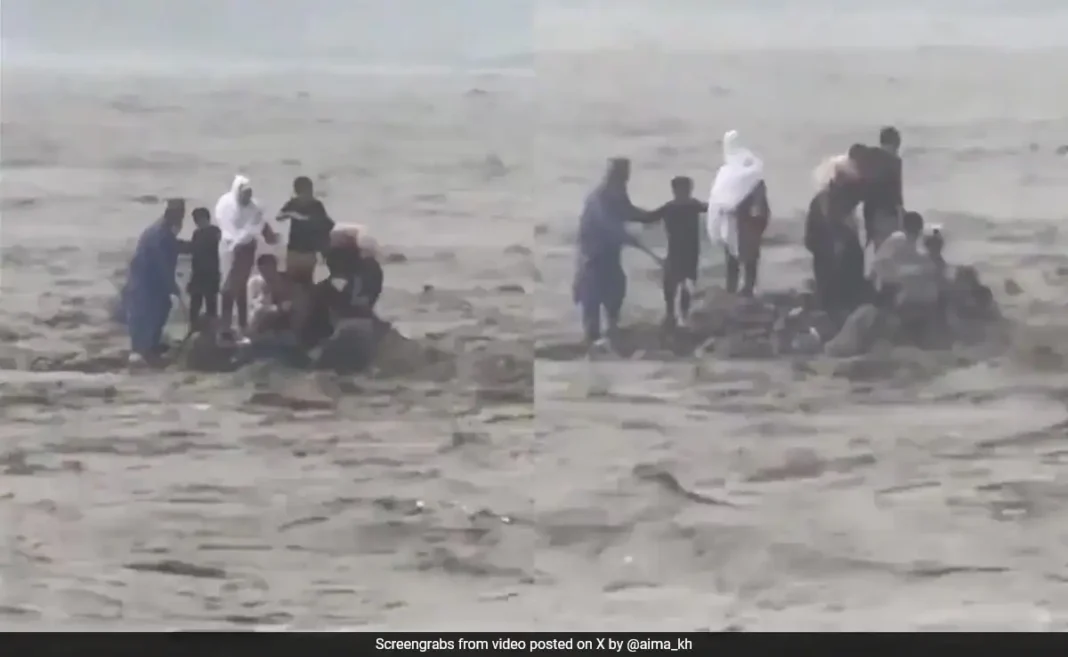I remember having a cup of tea that day with my colleagues beside a hotel along the road overlooking the Swat River. The water was calm, the scenery was photogenic, and tourist families were enjoying, taking selfies as a light breeze cooled the valley. I observed people having breakfast beside the hotel constructed on the riverbank, snapping pictures and even going into the water despite the unpredictable weather and numerous alerts.
Then, in a matter of moments, the sky darkened, the river turned muddy, the water roared, and the calm river started to transform into a flash flood. Many people still couldn’t restrain themselves from going out until it was too late. We heard about a family of 17 people who became trapped between the rising waters, and soon after, they were swept away by the merciless waves.
Later, social media showed visuals of a family—women, children, and elderly men—caught in the raging waters, crying out desperately for help as the flood surged around them. One by one, they were swept away by the merciless currents. As of now, rescue operations are ongoing: four people have been rescued alive, while 12 bodies have been recovered, and one person is still missing.
A resident informed me that this isn’t an isolated incident; many similar events have occurred in previous years, and this won’t be the last. Officials involved in the mismanagement have been suspended, and an inquiry is underway. However, this response feels more like a swift reaction rather than a genuine effort for reform or a prevention strategy.
Ali Ahmad, a climate change expert, emphasizes that incidents like these serve as a continuous reminder that climate change is a pressing reality and not just a random occurrence in nature. He points out that the Germanwatch Climate Risk Index Report for 2025 reveals that Pakistan ranked Number one on the Climate Risk Index for 2022. Ahmad further explains that our monsoon season has become increasingly unpredictable and extreme as a direct consequence of climate change, evident from the events of 2022 and the current situation in Swat.
Ahmad warns that the “rapid melting of glaciers combined with erratic rainfall contributes to massive flash floods that cannot be effectively managed with just sandbags and rescue operations; instead, they require comprehensive long-term planning”.
He stresses the need to redirect funds towards the construction of diversion channels and small dams. Additionally, he states, “Our efforts must include reforestation, the dissemination of accurate weather information, the establishment of community-level early warning systems, and restrictions on construction along riverbanks.”
Ahmad emphasizes that integrating climate change education and safety measures into the school curriculum is essential for raising awareness in future generations. He insists that the government must prioritize climate change as a top national issue rather than treating it as merely a seasonal concern.
Standing on the riverbank, watching the locals and rescue teams search for missing people, he views this as a natural warning. He added that we are among the most vulnerable yet least prepared for climate change.
“These floods are no longer surprising; rather, it is our inaction that is shocking.” He argues that if the tragedy in Swat doesn’t motivate us to take action, then the next flood undoubtedly will, and it will come at an even greater cost. We should transform the SWAT flood response into a national initiative rather than allowing it to become a forgotten headline. If we fail to act, tragedies like this will continue to impact our communities with even greater intensity.
The floods in Swat should mark the moment we finally take climate change and safety seriously, rather than allowing it to become just another disaster we choose to overlook.
Also Read: Role of Climate Change in Economic Uncertainty in Pakistan

Yasir Ahmad is a final-year MBBS student with a strong passion for science writing. He is dedicated to finding innovative ways to communicate complex topics, including climate issues and health. He was a former science writing intern at Scientia Cohort 4. His goal is to make important scientific information accessible in a clear and engaging manner.

